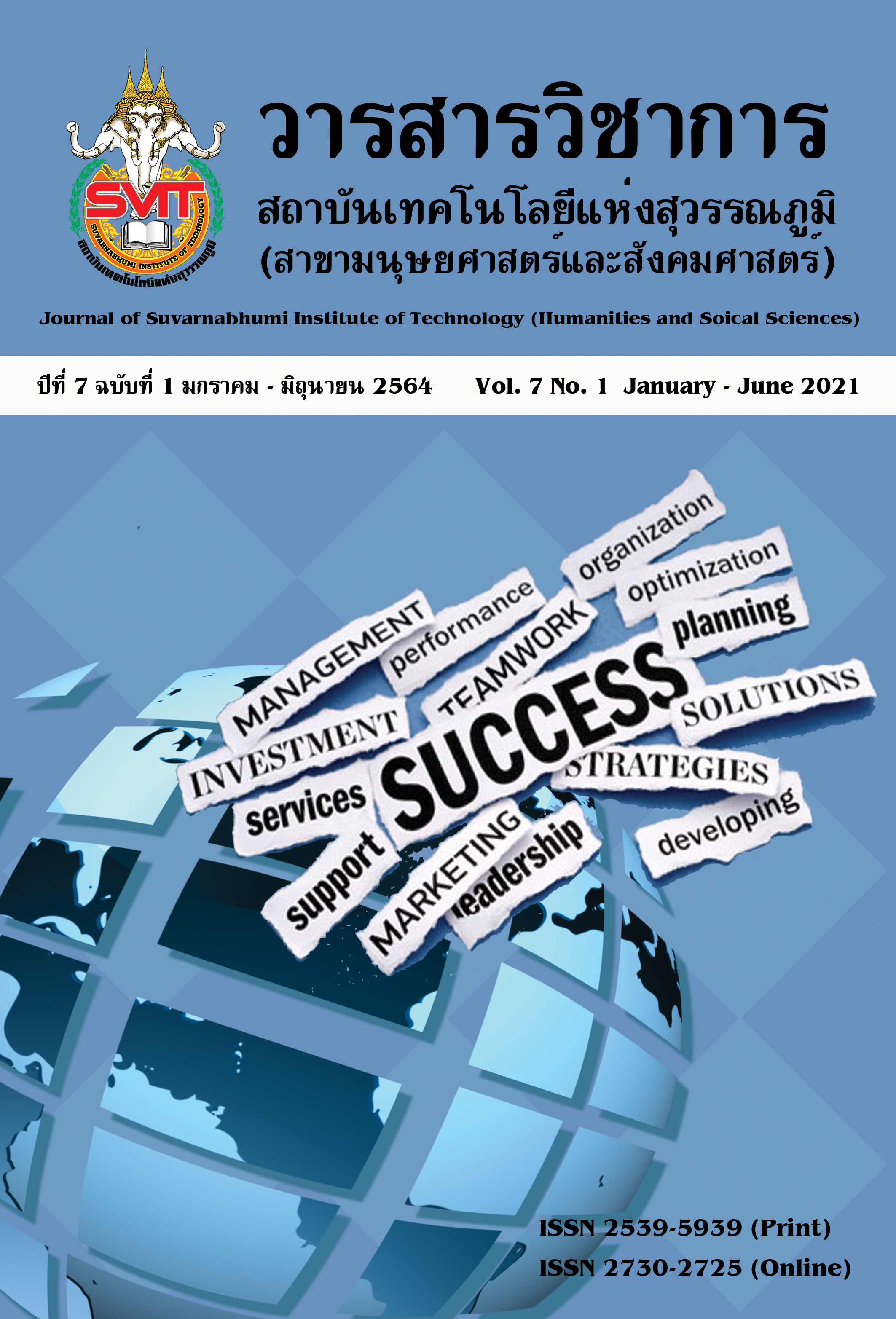DEVELOPING OF DEVELOPING QUALITY OF STUDENT LIFE MODEL UNDER THE OFFICE OF BASIC EDUCATION COMMISSION
Keywords:
Development, Model, Development of Quality of Student lifeAbstract
The purposes of this research were to study, to develop and to evaluate the development of a model for development quality of student’s life under the Office of Basic Education Commission. The method of research comprised three steps: 1) studying the model for development quality of students’ life. This research was mixed methods between quantity and quality research with two sample groups. The first was a quantity research, consisting of 242 persons including administrators, teachers, school committees and students. The second sample was qualitative research, and the informants were 12 persons with administrators, teachers, school committees and students. The statistical devices used for this study were a rating scale; the data were analyzed by mean, percentage, standard deviation and content analysis. The collection of qualitative data was done by structure interviews; 2) development the model for development quality of students’ life using Delphi Technique to get results from opinions of 17 experts for 3 rounds. The statistical devices used for this study were percentage, median and interquartile range; and 3) evaluating the model for development of quality of students’ life model by questionnaire obtaining opinions of 10 experts. The statistical devices used for this study were mean and standard deviation.
The results were as follow:
- The model for development quality of student life under the Office of Basic Education Commission comprised seven components which were 1) educational administration 2) participative management 3) health promotion in school 4) quality’s life 5) curriculum development 6) learning management and 7) development of student intervention system.
- The experts confirmed that model for development quality of students’ life under the Office of Basic Education Commission comprised seven components with 65 indicators which were 1) educational administration, 2) participative management, 3) health promotion in school, 4) Quality life, 5) curriculum development, 6) learning management, and 7) development student intervention system.
- The evaluation of the model for development quality of students’ life under the Office of Basic Education Commission validated every elements has usefulness and practical feasibility, and the accuracy can be used as a framework in determining the model for development student’s quality of life.as a whole and in each component was at the high level ( = 4.31, SD = 0.58). From the maximum to minimum averages were participative management ( = 4.40, SD = 0.67), the educational administration ( = 4.36, SD = 0.57), and development of student intervention system ( = 4.35, SD = 0.59). All components were utility, possibility in practice and accuracy could development in quality of student life model.
References
กรมอนามัย. (2558). รายงานประจำปี กรมอนามัย 2558 (พิมพ์ครั้งที่ 1). กองแผนงาน กรมอนามัย กระทรวงสาธารณสุข. กรุงเทพฯ: สำนักงานกิจการโรงพิมพ์องค์การสงเคราะห์ทหารผ่านศึก
ฆนัท ธาตุทอง. (2552). การจัดการชั้นเรียนห้องเรียนแห่งความสุข. กรุงเทพฯ: เพชรเกษมการพิมพ์.
ชุติมา สุรเศรษฐ, และจรินทร วินทะไชย. (2559). หลักสูตรระบบดูแลช่วยเหลือนักเรียน TEPE-58304. กรุงเทพฯ: เอกสารหลักสูตรอบรมแบบ e-Training.
นิสากร กรุงไกรเพชร และคณะ. (2560). สมรรถนะการสร้างเสริมสุขภาพของพยาบาลวิชาชีพ ภาคตะวันออก. วารสารคณะพยาบาลศาสตร์ มหาวิทยาลัยบูรพา, 25(3), 30-40.
ปุญชรัศมิ์ พันธุวัฒน์. (2560). การพัฒนารูปแบบการบริหารจัดการงานระบบดูแลช่วยเหลือนักเรียนด้านการคัดกรองนักเรียนของโรงเรียนพร้าววิทยาคม จังหวัดเชียงใหม่ (วิทยานิพนธ์ปริญญามหาบัณฑิต สาขาวิชาการบริหารการศึกษา). บัณฑิตวิทยาลัย, มหาวิทยาลัยราชภัฏเชียงใหม่.
ยุภาดี ปณะราช. (2558). การพัฒนารูปแบบการสอนคณิตศาสตร์ที่เน้นกระบวนการเรียนรู้คู่ความสนุกสนาน. วารสารปัญญาภิวัฒน์, 7(2), 157-168.
รัตนาภรณ์ สมบูรณ์. (2556). ข้อเสนอเชิงนโยบายเพื่อพัฒนาคุณภาพชีวิตนักเรียนโรงเรียนศึกษาสงเคราะห์(ปริญญานิพนธ์ปริญญาดุษฎีบัณฑิต สาขาวิชาการบริหารการศึกษา). บัณฑิตวิทยาลัย, มหาวิทยาลัย ขอนแก่น.
วิไลลักษณ์ พงษ์โสภา. (2555). สุขวิทยาจิต. กรุงเทพฯ: สำนักพิมพ์แห่งจุฬาลงกรณ์มหาวิทยาลัย.
สุคนธ์ สินธพานนท์. (2560). ครูยุคใหม่กับการจัดการเรียนรู้ สู่การศึกษา 4.0. กรุงเทพฯ: ห้างหุ้นส่วนจำกัด 9119 เทคนิคพริ้นติ้ง.
สำนักงานคณะกรรมการการศึกษาขั้นพื้นฐาน กระทรวงศึกษาธิการ. (2560). นโยบายสำนักงานคณะกรรมการการศึกษาขั้นพื้นฐาน ปีงบประมาณ พ.ศ. 2561. กรุงเทพฯ: โรงพิมพ์ชุมนุมสหกรณ์การเกษตรแห่งประเทศไทย.
สำนักงานคณะกรรมการพัฒนาการเศรษฐกิจและสังคมแห่งชาติ. (2559). แผนพัฒนาเศรษฐกิจและสังคมแห่งชาติ ฉบับที่ 12 พ.ศ. 2560-2564. สืบค้นเมื่อ 11 ตุลาคม 2560, จาก http://www.nesdb.go.th/ewt_dl_link.php?nid=6422
อับดลมาหยีด กาเส็มสัน. (2557). การดำเนินงานและแนวปฏิบัติที่ดีของโรงเรียนส่งเสริมสุขภาพในสำนักงานเขตพื้นที่การประถมศึกษาสตูล อำเภอเมือง จังหวัดสตูล (วิทยานิพนธ์ปริญญามหาบัณฑิต สาขาวิชาสาธารณสุขชุมชน). บัณฑิตวิทยาลัย, มหาวิทยาลัยราชภัฎสงขลา.
Halvorsrud L, Kalfoss MH. (2007). The Conceptualization and Measurement of Quality of Life in Older Adults: A Literature Review of Empirical Studies from 1994 – 2006. EJA, 4(4), 229 – 246.
Rosenzweig, J. M., & Brennan, E. M., (2012). Improving Work-Life Integration for Families of Children and Youth with Mental Health Disorders. Retrieved April 13, 2016, from http://pdxscholar.library.pdx.edu/socwork_fac/56/
Downloads
Published
Issue
Section
License
The articles published are copyrighted by the Sarasas Journal of Humanities and Social Science. The opinions expressed in each article in this academic journal are those of the individual authors and do not reflect the views of Sarasas Suvarnabhumi Institute of Technology. The authors are solely responsible for all aspects of their respective articles. Any errors or inaccuracies in the articles are the sole responsibility of the authors.



